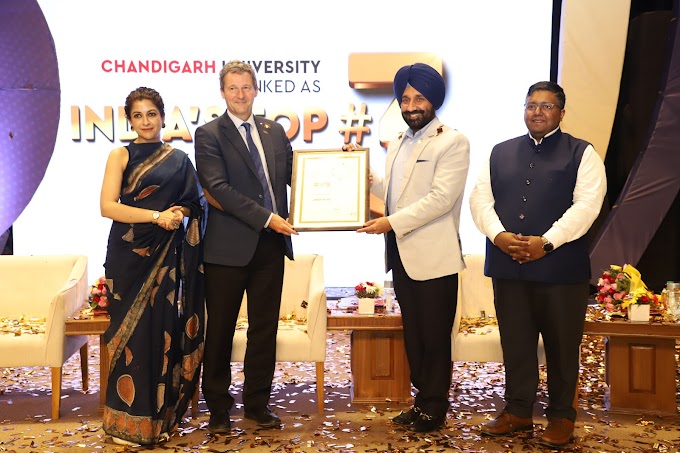Transparent & good governance, inclusive Growth and opportunities for all marks the emergence of New India under the leadership of PM Narendra Modi says Union MoS Rajeev Chandrasekhar
More
than 110 Corporate Leaders of top global multi-nationals participate in the 9th
Corporate Advisory Board organized by Chandigarh University
“Corporate Advisory Board (CAB)
organized today is a revitalized approach of creating rich & dynamic
Industry-Academia interface which will create future-ready, industry-ready, and
global-ready workforce, equipped with skills that the workforce in the
post-Covid world requires, is one the representatives of the vision of New
India, which has percolated into educational institutions across the country,”
said Rajeev Chandrasekhar, Union Minister of State for Electronics and
Information Technology & Skill Development and Entrepreneurship. He was
addressing the 9th Corporate Advisory Board (CAB) organized by
Chandigarh University, Gharuan. A total of 110 representatives from the top global
and Indian companies including 5 CEOs, 30 Presidents and Vice Presidents, 10
Founders of start-ups, 20 Managing Directors, and other senior functionaries of
top-notch companies and think-tanks of the corporate world attended CAB-2023,
the biggest and first ever national level platform to bring together all the 4
stakeholders; Government, Industry, Academia and Student Community together.
Satnam Singh Sandhu, Chancellor Chandigarh University; and Prof. Himani Sood,
Senior Vice-President Chandigarh University were amongst the dignitaries of the
university present on the occasion.
While addressing the corporate
leaders, Union Minister Rajeev Chandrasekhar said, “There is a sharp contrast
that exists between New India that is shaping-up under the leadership of Prime
Minister Narendra Modi and the Old India that existed for last 7 decades.
During the days of Old India, Government used to consider running of democracy
as an expensive burden as out of one rupee spent by the government, only 15% of
it could reach to the citizens in the form of benefits while the remaining 85%
would have been lost due to red-tapism and corruption. But the scenario changed post 2014, when India
demonstrated itself not just as the largest democracy but as a democracy that
delivers to its citizens. Now due to Digital India, more transparency has led
to 100% benefits of every rupee spent by the government reaching to every
section of the society by plugging the intermediation, leakages, corruption,
and delays."
He further added that, “There was
no dearth of opportunities in India but they were mainly concentrated to a few
influential families and groups. But during the last 9 years of Modi government
there has been inclusive growth for all the sections of people without any
discrimination. As a result India today is home to more than 90,000 start-ups
and 110 Unicorns which are due to extensive support given by government in the
form of PM Mudra loans given to the new generation of entrepreneurs.”
The Union Minister further added
that, “India was known to be a nation with poor infrastructure during the last
65 years as government could not provide sufficient funds. But now the world
knows New India which has the highest spend on building modern and world-class
infrastructure, fastest growing economy in the world, a nation with tax
collections that exceeding targets by 25% to 30% per year, modernized armed forces
with indigenous equipments".
“As India marches towards building
‘New India’, the government is focusing on creating opportunities for the
youth, which will play a major role in shaping the country’s future. With more
than 68.5% of its population below the age of 35, and 51% below 25, India
demonstrates the highest youth population in the world” the minister added. He
stated that ever since PM Narendra Modi took over the reign of the government,
special emphasis has been laid on training the youth with employment-oriented skills and
introduced the Skill India Mission in 2015. During the last 65 years, 30 Crore youth out of
the total 42 Crore in the workforce were found unskilled in 2014. Now in just 9
years of PM Modi Government, skill based training has been imparted to more
than 30.62 crore youth.
Representatives of the top IT
companies said, “As India marches towards the mission of ‘Developed India’, IT
sector will play a pivotal role in realizing the vision through various programmes.
The government launched the ‘Digital India’ programme in 2015 for strengthening
Digital infrastructure as a Core utility for every citizen, ensuring Governance
and services on demand, and digital empowerment of citizens. At present, India
is one of those countries in the world making the highest number of digital payments.”
Representatives of the top
Automobile companies said, “India has the largest growing market of electronic
vehicles. The government is promoting the making of electronic vehicles and promoting
their use, and subsidies have been provided for the same.”
Representatives of the top
Manufacturing companies said, “Government under the leadership of PM Modi has implemented
various programmes and policies to boost the Manufacturing sector in India. There
was a time when India depended on other nations for exporting raw
materials and products for driving the manufacturing sector in the
country. Due to the efforts and initiatives taken by the government,
India has turned into an export-oriented manufacturing hub during last 9
years.”
Delivering his address during
CAB-2023, Chandigarh University Chancellor Satnam Singh Sandhu said, “With a
mission to discuss the challenges and opportunities, & lay down a
futuristic roadmap to achieve the vision of Developed India, CAB-2023 for the
first time ever brought all the four stakeholders of the nation, i.e. Industry,
Academia, Student, and the Government, on a joint platform where corporate stalwarts
and representatives of other sectors deliberated on “Energizing
Industry-Academia collaborations for Amrit Kaal”, i.e. 2047. Under
the leadership of PM Modi, India
got its New
Education Policy after a gap of 34 years in 2020 that focuses
on major thrust areas like
internationalization, research, imparting industry-based and practical
education, and inculcating New age employment-oriented skills for
preparing future-ready workforce.”


%20(1).jpeg)
.jpg)


